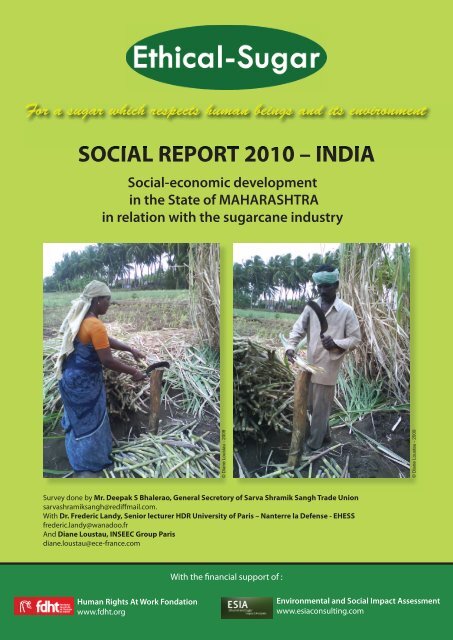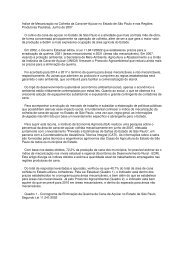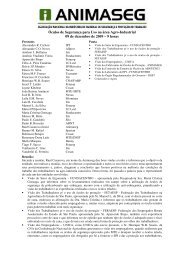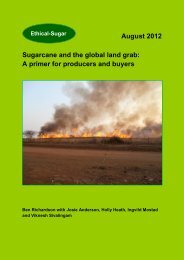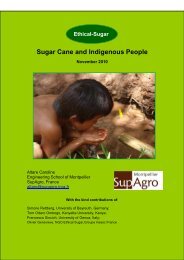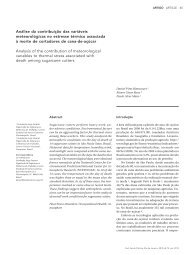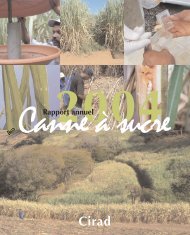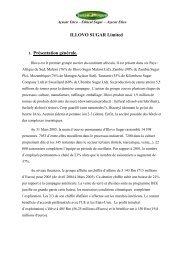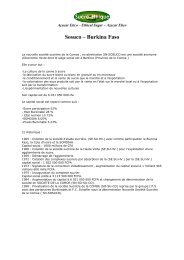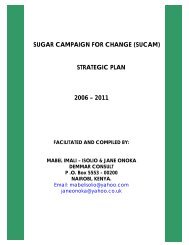Social Report 2010 â India - Sucre Ethique
Social Report 2010 â India - Sucre Ethique
Social Report 2010 â India - Sucre Ethique
Create successful ePaper yourself
Turn your PDF publications into a flip-book with our unique Google optimized e-Paper software.
For a sugar which respects human beings and its environment<br />
SOCIAL REPORT <strong>2010</strong> – INDIA<br />
<strong>Social</strong>-economic development<br />
in the State of MAHARASHTRA<br />
in relation with the sugarcane industry<br />
© Diane Loustau - 2009<br />
© Diane Loustau - 2009<br />
Survey done by Mr. Deepak S Bhalerao, General Secretory of Sarva Shramik Sangh Trade Union<br />
sarvashramiksangh@rediffmail.com.<br />
With Dr. Frederic Landy, Senior lecturer HDR University of Paris – Nanterre la Defense - EHESS<br />
frederic.landy@wanadoo.fr<br />
And Diane Loustau, INSEEC Group Paris<br />
diane.loustau@ece-france.com<br />
With the financial support of :<br />
Human Rights At Work Fondation<br />
www.fdht.org<br />
Environmental and <strong>Social</strong> Impact Assessment<br />
www.esiaconsulting.com
2<br />
Plan<br />
About Ethical Sugar<br />
Introduction<br />
State of MAHARASHTRA case for the sugarcane Industry in <strong>India</strong><br />
1. Summary and Preamble<br />
2. Specimen setup of a sugar mill<br />
3. Service conditions of factory workers<br />
4. Unique provision of retention allowance<br />
5. The legislative provisions about sole collective bargaining agent<br />
6. The struggle of field workers<br />
Some Better Management Practices in <strong>India</strong><br />
1. Example in a factory<br />
2. In the field<br />
3. The sector’s main actors: public, private and cooperative<br />
4. Intercrop with sugarcane<br />
Example of a civil society campaign linked with sugarcane in <strong>India</strong><br />
p. 3<br />
p. 4<br />
p. 5<br />
p. 5<br />
p. 5<br />
p. 6<br />
p. 8<br />
p. 8<br />
p. 9<br />
p. 10<br />
p. 10<br />
p. 11<br />
p. 13<br />
p. 14<br />
p. 15<br />
Special thanks for Violaine Richard, Master INSEEC Lyon<br />
and Remi Mussillier, Sup de Pub Lyon (France)<br />
<strong>Social</strong> <strong>Report</strong> <strong>2010</strong><br />
-<br />
ETHICAL-SUGAR
3<br />
About Ethical Sugar<br />
This research was undertaken for Ethical Sugar, an NGO that seeks to enhance dialogue within the<br />
sugar-ethanol industry with a view to improving its social and environmental development. Trade<br />
unions, companies, civil society activists and academics are all brought together as part of this<br />
dialogue, which allows Ethical Sugar to construct a more rounded vision of the different situations<br />
and positions that pertain in the industry and facilitate a multipartite form of Corporate <strong>Social</strong><br />
Responsibility.<br />
The recent growth in ethanol consumption is seen as an opportunity to affect this CSR as corporations<br />
in different countries are brought closer together through the influx of foreign direct<br />
investment, on the one hand, and the creation of new supply chains to export fuel, on the other.<br />
Ethical Sugar believe that as consumers come to recognise the close links forged across national<br />
boundaries, it is incumbent upon producing companies to surpass minimal legal standards of production<br />
and lay down a long-term strategy to avoid negative publicity and reassure their partners<br />
about their business ethics. In mature markets such as the EU or North America, this strategy has<br />
a longer history and typically invokes a strong element of social monitoring.<br />
<strong>Social</strong> <strong>Report</strong> <strong>2010</strong><br />
-<br />
ETHICAL-SUGAR
4<br />
Introduction<br />
A short note is to recall that <strong>India</strong> is neither Brazil nor the Dominican Republic. As far as sugarcane<br />
is concerned, the usual explanation of rural misery in the sugarcane world is the addition<br />
of large size estates, absent landlords, landless exploited laborers and free for all capitalism. This<br />
view might be a caricature for other countries too, but it is definitely a wrong image of the <strong>India</strong>n<br />
situation.<br />
Large estates? In 1990-91 (last data available), 46 % of the <strong>India</strong>n sugarcane area weas cropped<br />
by holdings below 2 ha. (Let us recall that the average holding size in <strong>India</strong> is slightly above one<br />
hectare). This does not mean that employing labourers outside the family sphere is not necessary,<br />
at least for the cutting season. However, this implies that employers are often small holders<br />
who alternatively must hire themselves as labourers when they become idle. This also means that<br />
the meager wages are less the result of labour exploitation by urban/foreign capital than a consequence<br />
of the poverty of many employers. All the same, the fate of labourers is quite gloomy,<br />
many of them being indebted to the farmer as they have taken an advance on their wage that<br />
forces them to work for him, year after year.<br />
Many of the labourers come from dry areas and work a few weeks in irrigated regions (Uttar<br />
Pradesh, Karnataka, and Maharashtra) before coming back home after the cane cutting and crushing<br />
season.<br />
Free for all capitalism? In <strong>India</strong> the state is everywhere, even though since the late 1980s economic<br />
liberalization has been taking place. Minimum wages do exist (true, rules are not followed). Subsidies<br />
for water and power are granted, that are key factors for cane cultivation since in <strong>India</strong> most<br />
of the crop is irrigated. Most of all, “statutory minimum prices” are defined each year by the Central<br />
government, completed by State Advised Prices” granted by the Union States. Refineries must buy<br />
the cane from farmers by following the SAP.<br />
This allows the maintaining of small farms in <strong>India</strong>. This action of the Government (that unfortunately<br />
also includes a lot of bureaucracy and leakages) is probably more efficient than the numerous<br />
cooperatives born in Maharashtra, most of them controlled by the Maratha caste, that operate<br />
like fiefdoms, under a small number of sugar barons who control a good part of irrigation water<br />
availability as well as vote banks.<br />
Frederic Landy - Senior lecturer HDR University of Paris X – Nanterre la Defense - EHESS<br />
<strong>Social</strong> <strong>Report</strong> <strong>2010</strong><br />
-<br />
ETHICAL-SUGAR
5 State of MAHARASHTRA case for the<br />
sugarcane industry in <strong>India</strong><br />
Survey done by Mr. Deepak S Bhalerao, General Secretory of Sarva Shramik Sangh Trade<br />
Union<br />
1. Summery and preamble<br />
Besides sugar, the use of Gur (Jaggery) and Khandsari (raw sugar) are the other sweeteners largely<br />
consumed in the state. An overall view of last 40 years will indicate increasing trend of their consumption.<br />
The central government stipulates policy for sale of sugar and at times there was control of the<br />
government and gradually the control is partial.<br />
This has wide effects on the industry.<br />
The co-operative sector sugar mills are facing problems. Worker’s participation in management<br />
and their active role at every decision making process will help the revival.<br />
By population, State of Maharashtra constitutes about one tenth of <strong>India</strong>’s population and generally,<br />
is the first or second state in the country for production of sweetener/ sugar, depending upon<br />
the crops and competes Utterpradesh, another larger state in <strong>India</strong>.<br />
State of Maharashtra (MS) is an industrially advanced state and apart from other industries, manufacture<br />
of sweeteners/sugar is one of the prominent industries. It has its routes in the rural parts of<br />
the state where sugarcane are cultivated. It has a direct impact and influences the politics of the<br />
state.<br />
In Maharashtra state sugar is manufactured from sugar cane only and not from any other sources<br />
like beat etc. As a by-product distilleries are given licenses by the government for manufacture<br />
of liquor. Ethanol which is a major by-product in other countries is yet to be developed in Maharashtra.<br />
2. Speciman setup of a sugarmill<br />
A medium scale sugar manufacturing unit shall have a following skeleton structure:-<br />
For an average of 1250 M.T. daily crushing capacity, factories should have around 850 workers. The<br />
daily recovery/ production of sugar shall be around 1250 bags of 100 kgs each i.e. 125000 kg per<br />
day. The general and average recovery of sugar is 10% of the sugar cane crushed per day. For such<br />
a unit, the work force of permanent nature would be around 450 whereas the seasonal employment<br />
would be around 400. The permanent work force consists of office staff and the factory staff<br />
from civil department, maintenance department, agriculture department, etc. The seasonal work<br />
force is appointed for the work related to crushing of the sugar cane.<br />
The production activities are commenced around October and are carried out till March, April or<br />
May next year depending upon the availability of sugarcane. The sugar manufacturing activity is<br />
carried out for about 160 days to 180 days per season.<br />
<strong>Social</strong> <strong>Report</strong> <strong>2010</strong><br />
-<br />
ETHICAL-SUGAR
6<br />
The major departments are crushing, engineering, boiler, chemical d, agriculture, civil , go down,<br />
etc.<br />
The sugar manufacturing process carried out in the faction has not undergone major changes<br />
over a period of time. However, the crushing department, which was earlier fully manual, has<br />
been mechanized. Similarly the packing of sugar into gunny bags has been mechanized and is no<br />
more done manually.<br />
During the season, the sugar mill works round the clock. The timing of the 3 shifts is generally<br />
from 12 afternoons to 8 p.m. (evening), 8 p.m. to 4 a.m. and from 4 a.m. to 12.00 noon.<br />
The workers called upon to report for work for 4 a.m. shift come to factory at night itself and they<br />
stay over in the factory premises, so as to commence work at 4 a.m.<br />
The sugar manufacturing process is such that the work is carried out continuously without any<br />
break. The workers are provided with 1 hour lunch time. However, they avail the lunch time in such<br />
a fashion that the process is not disturbed. The workers relieve each other for lunch time.<br />
The workers are required to work in fumes and hot atmosphere in the factory. Every sugar factory<br />
manufactures/ generates electrical energy for the running of the plant and machinery and the<br />
electricity from public companies is utilized for lighting purposes only.<br />
The sugarcane after crushing and after taking out the juice is utilized for burning the boilers, in<br />
place of coal or diesel etc.<br />
3. Service conditions of factory workers<br />
The service conditions of the workers are governed by various awards of the Wage Boards and as<br />
revise by various bilateral agreements. Unlike in other industries in <strong>India</strong>n states where the service<br />
conditions are determined and arrived at unit wise/ factory wise/ company wise, in sugar industry,<br />
in the State of Maharashtra, the service conditions are broadly stipulated industry wise and zone<br />
wise. There is uniformity in major service conditions like Basic Pay, Dearness Allowance, House<br />
Rent Allowance, Leave Facilities, etc. The local units stipulate other service conditions like employers<br />
contribution in canteen subsidy, annual bonus, etc.<br />
Sometime around 1954-55 the first Wage Board for sugarcane workers in the State of Maharashtra<br />
was constituted and the said wage board introduced uniform service conditions across the state.<br />
The second and third wage boards for further revision in the service conditions were constituted<br />
in the year 1965 and 1975 and the workers got pay and allowances revised. Since 1990 the employers’<br />
organization and the unions’ are entering into bilateral agreements revising the rates on<br />
the state level. The employers of Co-operative Sugar Industry as well as the private sector sugar<br />
mills in the state are well organized and their interest are protected by their federation. The unions<br />
participate in the negotiations on the state level platform and there are 2 state level federations<br />
having different affiliating units across the state to represent the cause of the workers.<br />
<strong>Social</strong> <strong>Report</strong> <strong>2010</strong><br />
-<br />
ETHICAL-SUGAR
7<br />
As a consequence of various Awards followed by the aforesaid bilateral agreements the salary of<br />
unskilled employee at lowest level is in the range of Rs.7000 per month and for skilled workers it<br />
is in the range of Rs.12, 000 per month. This consists of dearness allowance, basic wages, annual<br />
increments and house rent allowance etc. The linkage of wages to cost of living index and payment<br />
of compensation for increase in cost of living with a view to protect the purchasing power is<br />
a major achievement for the workers. The consumer price index for the purposes of computation<br />
of Dearness Allowance is announced by the Labour Department of the State Government. The<br />
system for linking wages to the cost of living commenced after the historic victory of Textile workers<br />
in their prolonged strike of 39 days of 1939-40 i.e. at the time of Second World War. The organized<br />
labour has represented their views to the labour department when the labour department<br />
introduced new series of consumer price index. The existing scheme of Dearness Allowance is<br />
based upon the family budget survey of 1960. The labour department has announced consumer<br />
price index with 1980 and 2001 as the basis of the index numbers formulated on the basis of family<br />
budget survey of 1980 and 2000. The workers are however not satisfied with the survey made<br />
by the labour department for the year 1980 and 2000 as they do not reflect the correct pattern of<br />
expenditure of working class in general and the rural working class in particular.<br />
© Diane Loustau - 2009<br />
<strong>Social</strong> <strong>Report</strong> <strong>2010</strong><br />
-<br />
ETHICAL-SUGAR
8<br />
4. Unique provision of retention allowance<br />
The sugar industry is a seasonal industry and as such all the work force is not gainfully appointed<br />
for the full years. The seasonal workers which constitute about 50% of the work force of the sugar<br />
factories is out of work for a period of about 6 to 8 months every year. The industry requires experience<br />
and knowledgeable workers. A demand therefore was made by the workers that they<br />
be paid Retention Allowance. Over a period of time, this issue has been one of the major subject<br />
matters for adjudication and decisions vide various bipartite agreements and awards. The industry<br />
has accepted in principal the need for payment of retention allowance and the rates thereof<br />
have been revised from time to time. Earlier the retention allowance was in the range of 15% to<br />
40% depending upon the skills of the seasonal workers. Presently the retention allowance is paid<br />
at the rate of 30% for the unskilled workers, 40% for the skilled workers and 50% for the highly<br />
skilled workers. The workers who have worked for 66% of the period of previous season are paid<br />
retention allowance at the above rate in the first month of the commencement of next crushing<br />
season.<br />
5. The legislative provisions about sole collective bargaining agent<br />
The sugar industry in the state is governed by “The Bombay Industrial Relations Act 1946”, which is<br />
applicable to only a section of industries like Power Generation, transport, textile, wool, etc. This<br />
act provides for stringent restrictions for workers to resort to direct actions like strike etc. The act<br />
provides for recognition and approval to the trade unions of the workers. It has been a consistent<br />
demand of the working class that the issue of union recognition be decided by secret ballot and<br />
not by mere membership records. The B.I.R. act however provides for recognition by verification<br />
of membership records only. The unions having membership to the tune of 30% and above from<br />
amongst of the work force in a given local area are accepted as approved and representative union<br />
and they are extended various rights under the act. They are the sole collective bargaining agents<br />
on behalf of the workers. The workers in every sugar mill are organized and are represented by the<br />
unit level approved and representative trade union. The industry wide workers of sugar industry<br />
are represented by 2 federations at the state level. Unlike other industries where the workers are<br />
governed by Industrial Disputes Act, 1947, the workers of sugar industry are governed by B.I.R.<br />
Act.<br />
Other benefits<br />
As a consequence of collective bargaining the workers have achieved the above benefits as well<br />
as various other benefits like House Rent Allowance paid at 5% of basic and dearness allowance,<br />
casual leave of 10 days, privilege leave (Annual leave with wages) at 1 day for every 20 days of<br />
work, paid festival holidays of 12 days a year. During the seasoned period, the workers work on<br />
paid festival holiday and they are granted alternate leave and only in off season period the workers<br />
enjoy the holidays on the days fixed.<br />
<strong>Social</strong> <strong>Report</strong> <strong>2010</strong><br />
-<br />
ETHICAL-SUGAR
9<br />
Self help credit societies at factory level :<br />
The workers have formed their co-operative credit societies at the factory level and they themselves<br />
contribute and raise funds for the benefit of their difficult times when they draw loan from<br />
the said society and repay it to the society from salary. These societies assist the workers financially<br />
at the crucial times.<br />
6. The struggle of field workers<br />
The major work force in sugar industry is outside the sugar mill i.e. the workers who are involved in<br />
sugarcane cutting from the fields and transporting it to the sugar factories. In the state of Maharashtra<br />
the estimated number of such workers is to the tune of 10 to 12 lakhs (100 000). Their work<br />
is also seasonal in nature. The civil department staff of the sugar factories assesses the sugar cane<br />
development in fields and organizes the continuous flow of sugar cane to the factories. While<br />
establishing every sugar cane factory, specific areas are specified and the sugarcane produced in<br />
the fields is brought to their respective sugar mill. The workers’ work in groups and the sugarcane<br />
is transported from the fields to the mill with the help of bullock carts, tractors and trucks. The<br />
workers concerned in this activity involve large number of female workers and presently this work<br />
is got done on contract basis by the contractors who appoint gangs consisting of 5 to 15 workers<br />
each to transport the same to the sugar mills. These workers are paid on piece rate basis i.e.<br />
on the basis of the sugar cane cut coupled with the distance that is required to be traveled for<br />
transporting it to the sugar mills. These workers are scattered but at the time of season, they are<br />
organized and alongwith the overall revision of the permanent workers of the sugar industry, the<br />
field workers always demand for revision in their rates and their rates are revised after prolonged<br />
struggles. As they are piece rated workers they are no fixed working hours and there are no other<br />
facilities for these workers.<br />
<strong>Social</strong> <strong>Report</strong> <strong>2010</strong><br />
-<br />
ETHICAL-SUGAR
10 Some Better Management Practices in<br />
<strong>India</strong><br />
By Diane Loustau, Bachelor ECE – INSEEC Paris<br />
Management practices that have the objective to improve the quality of farmers and employees’<br />
conditions do exist in <strong>India</strong>n sugar companies.<br />
In this report we present some of these practices. We also encourage companies to adopt this type<br />
of management and to incorporate it in their strategy in order to develop a strong environment<br />
management system.<br />
All sugar factories can understand that people can be a real competitive advantage.<br />
1. Example in a factory<br />
Canteens<br />
Employees can give a part of their salary in “canteen budget” in order to have lunch in the canteens.<br />
Furthermore, canteen system provides a balanced diet, which is an important part of a<br />
healthy lifestyle.<br />
Medical facility / Baby welfare centre inside the factory<br />
An access to a welfare centre inside the factory is a real necessity. When the company takes care of<br />
the health of their employees it’s a real competitive advantage: employees are in better condition<br />
to go at work, they feel secure and safe in the work area. A baby welfare centre is also an important<br />
point, because it’s essential to take care of the employee’s family. Thus, companies must develop<br />
health programs and medical centres, to protect their labour force, and maybe also improve the<br />
productivity.<br />
Allotment of House sites<br />
The factory can put houses at employees’ disposal if they live far away from work. They can live<br />
there with spouse and children. This system can develop the mobility of employees in your company<br />
(for management staff) and the company is seen as a “human”.<br />
Uniforms / Shoes<br />
All employees wear uniform including shoes, in the field and in the factory. It is a security system<br />
but also a good tool to indentify company workers.<br />
<strong>Social</strong> <strong>Report</strong> <strong>2010</strong><br />
-<br />
ETHICAL-SUGAR
11<br />
Educational Scholarship<br />
« <strong>India</strong> is a land of Bright promise.<br />
It is also extremely poor.<br />
About 27m <strong>India</strong>ns will be born<br />
this year. Unless things improve,<br />
almost 2m of them will die before<br />
the next general election. Of the<br />
children who survive, more than<br />
40% will be physically stunted by<br />
malnutrition. Most will enrol in a<br />
school, but they cannot count on<br />
their teacher showing up. After<br />
5 years of classes, less than 60%<br />
will still be stumped by simple<br />
arithmetic »<br />
The Economist 21/05/09<br />
All factories have their own school with low fees that can be attended by the employees’ children.<br />
This system is a solution to illiteracy in <strong>India</strong> and is a real key factor in all factories.<br />
2. In the field<br />
BMP’s are the testimony of factories’ commitment to the socio-economic development of the<br />
farming community.<br />
The company had to develop a strong network of employees in the field, for example with local<br />
offices. Thus, cane growers are always in contact with the local company representative.<br />
Services to farmers in the areas of: nursery management and sampling of soil for<br />
fertilizer application.<br />
It’s a formation in agronomy that presents different types of practices for the cane grower: Soil<br />
Analysis, prescriptions and crop protection adapted to different soil and size field (individual counseling).<br />
It’s also the good way to present bio-control agents or other environmental tools and to<br />
improve their utilization.<br />
The technology services provided to the farmers for raising sugarcane crop (from planting to harvest)<br />
is intense with the result; it demonstrates that the average cane yield of the farmers per<br />
hectare over the years increases.<br />
<strong>Social</strong> <strong>Report</strong> <strong>2010</strong><br />
-<br />
ETHICAL-SUGAR
12<br />
Regular demonstrations and field visits<br />
Demonstration and field visits are used to create awareness on new technologies like farm mechanization,<br />
deep trench and wetland planting, new varieties etc. Farmers can have a vision of these<br />
new technologies; they can speak about it, share ideas and discuss about the results. It is sometimes<br />
difficult to change farmers’ habits in term of mechanization, wetland planting, etc. Field<br />
visits can encourage them to change and to accept new farming methods.<br />
Plant protection<br />
Companies have to develop measures to protect the crops from losses caused by plant and pest<br />
diseases and to present them to the farmers.<br />
Regular information dissemination and awareness is created through training of farmers<br />
Trainings can present tactics information like irrigation, fertilization, and fertilization. They can<br />
have different forms like: behavioral training programs, mass awareness programs, group work.<br />
Trainings are essentials; they have resulted loyalty of the cane farmers to the sugar factory for<br />
many companies. Building a close relationship with your farmers improve their trust in your company.<br />
Moreover when they attend to trainings, they are able to adapt their behaviour to new farming<br />
methods and improve their productivity.<br />
In a country like <strong>India</strong> where the link between farmers and company had to be very strong, the<br />
training system had to be used and develop in all the management strategy.<br />
Strong communication<br />
To maintain the link between factories and farmers it’s important to use different ways of communication<br />
like house publications, pamphlets, television, video films, radio, etc. Communicate about<br />
companies’ research or project is a way to explain new systems (mechanization, fertilization, etc).<br />
By diversifying the communication, companies reinforce the relationship with cane growers and<br />
give them different information resources.<br />
Prompt payment, financial help and insurance<br />
- The company had to ensure that the payment to the farmers is made as soon as possible. In<br />
spite of the fact that sometimes it is very difficult for companies to respect the delay of payment<br />
because of different factors like cash fluctuation, it is very important to respect a minimum dead<br />
line to pay cane growers. Without this condition, a risk of revolt and resignation from the farmer<br />
community exist. It’s the company’s function to ensure the delay and to pay suppliers in time.<br />
<strong>Social</strong> <strong>Report</strong> <strong>2010</strong><br />
-<br />
ETHICAL-SUGAR
13<br />
- The company helps in arranging institutional credit to the growers. It also provides financial services<br />
like cane loan, crop loan, housing loans, vehicles loans.<br />
- The company can also provide an insurance service like crop insurance (in case of bad harvest<br />
or important losses during the growth period) but also a Health insurance. Medical and accident<br />
group insurance can cover to all the sugarcane farmers in its area at a very nominal premium. In<br />
case of an accidental wound or death farmer family receive compensation.<br />
3. The sector’s main actors: public, private and cooperative<br />
The <strong>India</strong>n sugar industry has been marked by a coexistence<br />
of different ownerships and management<br />
structures since the beginning of the 20th century.<br />
The sector is composed of three distinct categories<br />
- public mills, private mills that procure sugarcane<br />
from nearby cane growers and cooperative mills<br />
owned and managed jointly by farmers. Public mills<br />
used to count about 6% of the total working mills,<br />
approximately 40% for private mills and 53% for cooperative<br />
mills. But this distribution has undergone<br />
a significant shift. Indeed, sugar productions from<br />
private mills now represent more than 54 % of the<br />
total production while cooperative mills’ share has<br />
decrease to 43%.<br />
Because of the higher number of units in states such<br />
as Maharashtra and Gujarat, the cooperatives dominate<br />
sugar production. However, in these states, private<br />
and other sugar mills are still leaders in sugar<br />
production in Uttar Pradesh (UP), Andhra Pradesh<br />
(AP), Haryana, and Tamil Nadu (TN). Because the cooperatives<br />
are located in states with higher sugarcane<br />
yields and higher sucrose content, they have a higher<br />
cane recovery rate than private sector mills. However, when cooperatives and private sector mills<br />
have a reasonable presence, private sectors mills have a higher recovery rate.<br />
© Diane Loustau - 2009<br />
<strong>Social</strong> <strong>Report</strong> <strong>2010</strong><br />
-<br />
ETHICAL-SUGAR
14<br />
4. Intercrop with sugarcane<br />
A good crop of cabbages in cane<br />
The intercropping of sugarcane enables cane growers to produce food, or<br />
cash crops, between the cane rows in plant cane.<br />
With some good tactics, cane growers should be able to produce effective<br />
yields of intercrops within 3 - 5 months from planting.<br />
The crops can then be eaten, exchanged, or sold.<br />
With this system farmers can gain cash during the growing period of the<br />
cane. The return on investment for farmers with sugarcane is very low. However,<br />
it is still a safe crop because of the Statutory Minimum Price (SMP) and<br />
it can be completed with intercropping that assures revenue for the rest of<br />
the year.<br />
Intercrops of young beans in cane<br />
Planting the Food Crop<br />
The most suitable food crops for intercropping dry land plant cane are for example:<br />
Cabbages, Green mielies, Green beans, Sweet potatoes, Maize …<br />
Cane growers can also use borders with coconut and aubergine. This system is largely applied in<br />
<strong>India</strong> because of the small field size.<br />
Bio fertilizer crop<br />
Negative effects of chemical fertilizers on the ecosystem are also increasingly taken into account.<br />
However, this effect can be reduced by appropriately combining chemical fertilizers with other<br />
sources of nutrients. Field experiments carried out with various integrated nutrient supply systems<br />
for sugarcane viz., application of organics, and bio fertilizers, raising leguminous intercrops<br />
(daincha) and in situ incorporation and recycling of crop residues.<br />
<strong>Social</strong> <strong>Report</strong> <strong>2010</strong><br />
-<br />
ETHICAL-SUGAR
15<br />
Example of a Civil society campaign<br />
linked with sugarcane in <strong>India</strong><br />
INDIA: Sugarcane cutters starving and living in abject poverty in Surat, Gujarat<br />
ASIAN HUMAN RIGHTS COMMISSION - URGENT APPEALS PROGRAM<br />
11 April 2005<br />
---------------------------------------------------------------------<br />
HA-07-2005: INDIA: Sugarcane cutters starving and living in abject poverty in Surat Gujarat<br />
INDIA: Malnutrition; extreme poverty; government neglect; caste discrimination; being underpaid<br />
---------------------------------------------------------------------<br />
Dear friends,<br />
The Asian Human Rights Commission (AHRC) has received information regarding the living<br />
conditions of adivasis (tribal people) employed as sugarcane cutters at the Bardoli Sugar Factory<br />
in Surat, Gujarat. The factory, under the Co-operative Societies Act, is governed by the Registrar<br />
and employs the adivasis through a contractor. The factory, in accordance with the act, is further<br />
supposed to provide accommodation and facilities for the majority of its workers. However, the<br />
current facilities provided to the adivasi workers are appalling and the villagers do not have access<br />
to adequate water, shelter, health care or food.<br />
The AHRC urges you to write to the Registrar of the Co-operative Societies Act and other related<br />
authorities in Gujarat and Surat bringing to their attention the plight of these sugarcane cutters.<br />
Further, please press upon the government's role in this situation and ask that immediate assistance<br />
be provided for the victims.<br />
Urgent Appeals Desk -- Hunger Alert<br />
Asian Human Rights Commission (AHRC)<br />
-----------------------------------------------------------<br />
<strong>Social</strong> <strong>Report</strong> <strong>2010</strong><br />
-<br />
ETHICAL-SUGAR
16<br />
Detailed information<br />
Camp Location :<br />
Near Dhodansa, Vaghnera, Tansadabar camps under Bardoli Sugar Factory, taluka Mandvi, District<br />
Surat, Gujarat, <strong>India</strong><br />
Name of victim: Mr. Manilal, age 34, Ms. Shilaben, age 28, and many other adivasis employed by<br />
the Bardoli Sugar Factory.<br />
Case details :<br />
The Bardoli Sugar Factory, under the Co-operative Societies Act, is governed by the Registrar and<br />
provides living accommodations for its adivasi workers. Mr. Manilal and Ms. Shilaben are both<br />
adivasis contracted to work under the Bardoli Sugar Factory. Both are landless and live in camps<br />
provided by their cooperative society employers. Traditionally, they are basket weavers by profession<br />
however, in order to earn enough to live, both became sugarcane cutters. Mr. Manilal states,<br />
"Otherwise my family members and I would die of starvation".<br />
The living conditions in the camps where the sugarcane cutters live are horrendous. Water is the<br />
primary concern in the camps. Water is so scarce that sometimes even drinking water is not available.<br />
Bathing is seldom heard of and the women must bring their clothing to their worksite in<br />
order to wash them. Toileting is also a great concern and as the camps are crowded with men,<br />
women and children, there is no privacy for this basic function.<br />
Moreover, the camps are extremely filthy and riddled with mosquitoes, flies and other insects. Ms.<br />
Shilaben laments, "because the camp lies next to an open gutter, we are surrounded by poisonous<br />
insects and get bitten frequently". She further explains that the shelters provided by their employers<br />
merely consist of a few sticks and a tarpaulin. One cannot stand in their shelters and often<br />
times, dogs and cattle from the area join them in their homes.<br />
The food provided at the campsite mainly consists of grains such as wheat, rice, juvar (cream colored<br />
grains) and pulses. However, often times, the foodstuff is spoiled, and is dirty, full of stones,<br />
broken or infested with worms. If the food is not cleaned and cooked properly the families fall ill.<br />
Frequently however, cooking is not possible as firewood can be scarce.<br />
As adivasis, or scheduled tribes, the sugarcane cutters experience much discrimination against<br />
them. Often, the cutters are called dirty and lazy by upper caste villagers. Further, though the<br />
High court order is to pay Rs. 108/- per Koiyat (pair of workers), it is not followed. The mukardam<br />
(middleman who contracts the adivasis to the factory) pays much less to the people. Additionally,<br />
while the mukardam keeps detailed work records, he will not release them or provide evidence of<br />
due pay.<br />
<strong>Social</strong> <strong>Report</strong> <strong>2010</strong><br />
-<br />
ETHICAL-SUGAR
17<br />
The adivasis employed by the Bardoli Sugar Factory are in need of immediate assistance. This includes<br />
consumable foodstuff, permanent/semi-permanent shelter, medical facilities with at least<br />
one nurse, school facilities for children, and hand pumps to provide safe drinking water. Further,<br />
the sugarcane workers deserve to receive their full pay and the mukardam system should be abolished.<br />
Instead, the factory and its cooperative society should deal directly with the laborers.<br />
Finally, according to Professor S.R. Bhansali's commentary (The Gujarat Co-Operative Societies<br />
Act, 1961; 2004 edition) on the Co-operative Societies Act, the Registrar is not just a registering<br />
officer, but is expected to provide assistance, supervision, advice and control to the cooperative<br />
societies. Thus, as it is the Registrar's role to oversee the actions of cooperative societies, he must<br />
take responsibility for the current plight of the sugarcane cutters and provide the immediate steps<br />
necessary to improve their living conditions.<br />
Suggested action<br />
Please write to the Registrar of the Cooperative Societies Act reminding him of his role in this matter<br />
and asking for immediate assistance to the sugarcane cutters. Additionally, please write to the<br />
Chairman of Sugarcane Industry, Chief Minister of Gujarat, and other related government officials<br />
in regards to the living conditions and employment concerns of the sugarcane cutters.<br />
Sample letter:<br />
Dear __________,<br />
RE: INDIA: Sugarcane cutters starving and living in abject poverty in Surat, Gujarat<br />
I am deeply disturbed to hear of the poor living conditions that plague many adivasi workers<br />
employed under the Bardoli Sugar Factory in Surat, Gujarat. While basket weavers by tradition,<br />
these adivasi have had to take on work as sugarcane cutters in order to survive. The sugar factory,<br />
under the Cooperative Society Act, must provide living quarters, food, shelter and healthcare<br />
for its employees. However, the camps provided by the factories are appalling and the food<br />
supply insufficient.<br />
The sugarcane cutters live in shelters made from sticks and tarpaulins, open to animals and other<br />
intruders. The food stuff provided is usually rotting or infested with worms and stones. Water<br />
and firewood is also scarce; the workers have to bath and wash clothes at work and often cannot<br />
even cook their own food.<br />
<strong>Social</strong> <strong>Report</strong> <strong>2010</strong><br />
-<br />
ETHICAL-SUGAR
18<br />
Further, the sugarcane cutters are employed by the factory through a Mukardam (contractor).<br />
The system however, is corrupt and unreliable. Workers are not given their minimum wage and<br />
are often handled very poorly. The sugarcane cutters do not have direct contact with the factory<br />
and must go through the Mukardam in order to deal with their employers.<br />
As a Cooperative Society, the Bardoli Sugar Factory is governed by the Registrar by the Cooperative<br />
Societies Act. It is in this position that the basic needs and rights of the workers are upheld.<br />
As of now however, the sugarcane cutters are still in need of consumable foodstuff, permanent/<br />
semi-permanent shelter, medical facilities with at least one nurse, school facilities for children,<br />
and hand pumps to provide safe drinking water.<br />
I urge you to investigate this matter further and to appeal to the Registrar that assistance must<br />
be provided to improve the living conditions of these adivasi workers. Moreover, I hope that you<br />
will press for the Mukardam system to be abolished so that the sugarcane cutters can communicate<br />
directly with the Bardoli Sugarcane Factory.<br />
Yours sincerely,<br />
---<br />
Please send your letters to:<br />
1. Mr. Khand Niyamak (Chairman – Sugar)<br />
Gujarat State<br />
Dr. Jivraj Mehta Bhavan,<br />
Block, No.-8, 2nd Floor,<br />
Gandhinagar-382 010, Gujarat<br />
INDIA<br />
Tel: +91 79 2325 3437, 2325 3435<br />
Fax: +91 79 2325 3435<br />
2. Mr. S. A. Shekh<br />
Nayab Sachiv (deputy Secretary-cooperatives)<br />
Krusi & Sahakar Vibhag, Block -4 2nd Floor<br />
Sachivalay, Gandhinagar-382 010<br />
INDIA<br />
Tel:+91 79 2325 0859<br />
Fax:+91 79 2322 0417<br />
3. District Registrar<br />
Sahkari Mandli ( Sugar)<br />
Nanpura, Surat- 395 001, Gujarat,<br />
INDIA<br />
Tel: +91 26 1247 0162<br />
Fax: +91 26 1247 0162<br />
4. Registrar<br />
Gujarat State<br />
Dr. Jivraj Mehta Bhavan, Block- 10,<br />
Gnadhinagar 382 010, Gujarat<br />
INDIA<br />
Tel: +91 79 2325 3868<br />
Fax: +91 79 2325 3877<br />
<strong>Social</strong> <strong>Report</strong> <strong>2010</strong><br />
-<br />
ETHICAL-SUGAR
19<br />
Please send copies to:<br />
1. Mr. Narendra Damodardas Modi<br />
Chief Minister's Office<br />
Block No 1, 5th Floor, New Sachivalaya,<br />
Gandhinagar 382 010, Gujarat<br />
INDIA<br />
Tel: +91 79 2323 2611 to 18<br />
Fax: +91 79 2322 2101<br />
Email: cm@gujaratindia.com<br />
2. Shri Justice A. S. Anand<br />
Chairperson<br />
National Human Rights Commission of <strong>India</strong><br />
Sardar Patel Bhawan, Sansad Marg<br />
Faridkot House, Copernicus Marg<br />
New Delhi-110001<br />
INDIA<br />
Tel: +91 11 23074448<br />
Fax: +91 11 23384863<br />
Email: covdnhrc@nic.in, ionhrc@nic.in<br />
3. Mr. Kunwar Singh<br />
Chairman<br />
National Commission for Scheduled Tribes<br />
Lok Nayak Bhawan, 5th Floor<br />
New Delhi 110 003<br />
INDIA<br />
Tel: +91 11 2462 4628<br />
Fax: 2462 4628<br />
Email: ksingh_chairman.ncst@indiatimes.com<br />
4. Mr. Jean Ziegler<br />
UN Special Rapporteur on the Right to Food<br />
c/o Mr. Carlos Villan Duran<br />
Room 4-066<br />
Office of the United Nations High Commissioner<br />
for Human Rights,<br />
Palais Wilson,<br />
Rue des Paquis 52, Geneva<br />
SWITZERLAND<br />
Tel: +41 22 917 9300<br />
Fax: +41 22 9179010<br />
Email: sect.hchr@unog.ch<br />
5. Mr. Miloon Kothari<br />
UN Special Rapporteur on adequate housing<br />
Att: Ms. Cecilia Moller<br />
Room 4-066/010<br />
UNOG-OHCHR, CH-1211, Geneva 10<br />
SWITZERLAND<br />
Tel: +41 22 917 9265<br />
Fax: +41 22 917 9010<br />
6. Mr. Pedro Medrano Rojas<br />
Country Director<br />
World Food Programme<br />
2 Poorvi Marg<br />
Visant Vihar<br />
New Delhi 110 057<br />
INDIA<br />
Fax: +91 11 2615 0019<br />
<strong>Social</strong> <strong>Report</strong> <strong>2010</strong><br />
-<br />
ETHICAL-SUGAR
www.sucre-ethique.org<br />
-<br />
www.acucar-etico.org<br />
-<br />
www.ethical-sugar.org<br />
Adresses Ethical Sugar :<br />
<strong>Sucre</strong> <strong>Ethique</strong> International - 6, allée de la Malletière 69600<br />
Oullins. Lyon, France<br />
Ethical Sugar Switzerland - Rue des terreaux 8, 1003. Lausanne,<br />
Switzerland<br />
Ethical Sugar UK - 2 Wigley Cottages - The Hollow Ravensthorpe<br />
NN6 8EN. Northampton, Great Britain<br />
For a sugar which respects human beings and its environment


